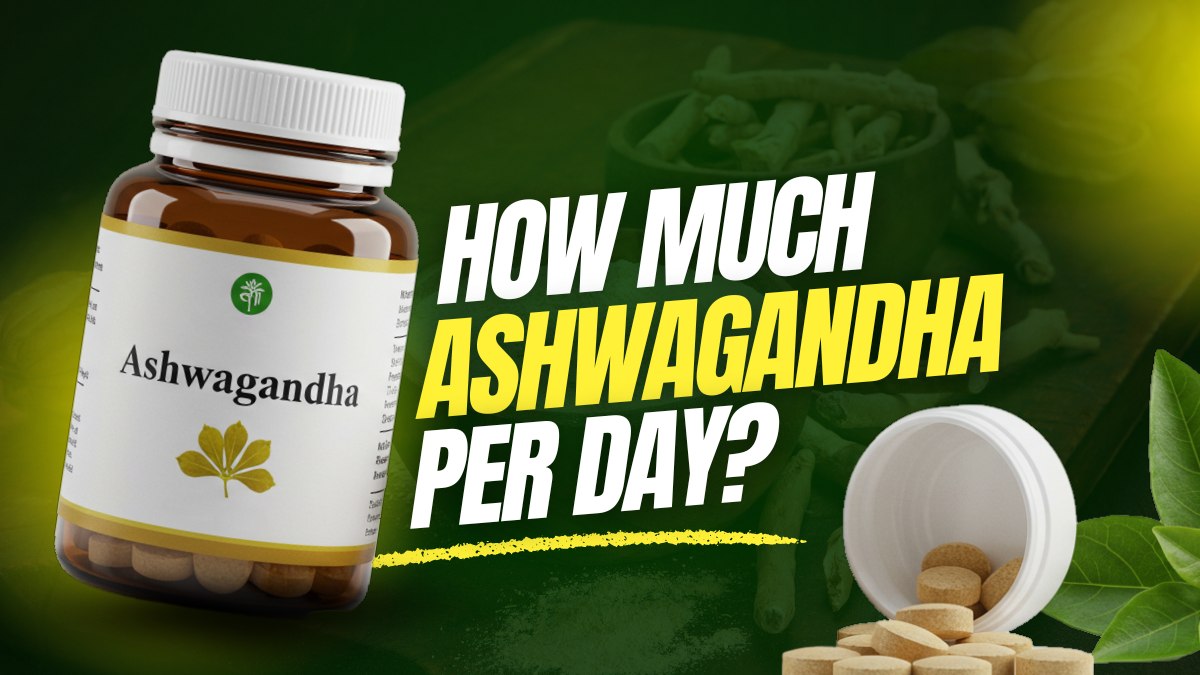
You’ve probably heard of ashwagandha. Maybe you’ve seen it popping up in your wellness feeds? The herb has a reputation for amping up your wellness… from taming chronic stress to boosting energy.
But like any powerful natural remedy, getting the dosage right is absolutely key. Too little, and you might not experience the benefits; too much, and you could run into unwanted side effects.
So, you might be wondering, “How much ashwagandha per day should I actually take?” This isn’t a one-size-fits-all situation, and that’s exactly what we’re going to unpack in this guide!
We’ll break down what ashwagandha is and why it’s so revered. Let’s take a closer look at its benefits, the crucial science behind finding your ideal daily intake, and key precautions to keep in mind.
What Is Ashwagandha?
Ashwagandha, an ancient herb, has been a cornerstone of Ayurvedic medicine for centuries. Originating from India and parts of Africa, this plant is counted as an “adaptogen,” meaning it could help your body adapt to all kinds of stress.
Traditionally, it’s been used to boost energy, improve sleep, sharpen focus, and promote a sense of balance and well-being. These ashwagandha benefits make it a captivating natural remedy worth exploring.
General Recommended Dosage
The typical recommendation hovers around 300 to 1,000 milligrams of ashwagandha root extract, usually divided into two doses (morning and evening).
However, there’s some wiggle room based on what you’re hoping to achieve. For instance, stress relief might call for a different amount than supporting sleep or athletic performance.
Different factors—like your individual body weight, overall health, and the potency of the ashwagandha extract—also play a role.
So, while that range gives you a starting point, the best move is to chat with a doctor who can give you personalized advice tailored to your unique needs!
Dosage Based on Specific Goals
The right ashwagandha dosage can make all the difference in achieving your desired results. So, how much ashwagandha per day should you be taking?
We recommend staying within the lower to moderate range which is 300–1,000 mg daily.
Still, it depends on whether you’re using ashwagandha to increase testosterone, encourage muscle growth, or promote sleep.
However, while the quantity might overlap, the timing and the specific ways ashwagandha may support each goal can differ. Let’s delve into the nuances!
How Much Ashwagandha per Day for Muscle Gain?
Ashwagandha’s anti-inflammatory and antioxidant effects may aid in muscle mass recovery after workouts, indirectly supporting muscle growth over time. It works by combating oxidative stress that occurs during intense exercise. To make the most of ashwagandha for muscle gain, consistently use it every day timed around your exercise.
How Much Ashwagandha per Day for Sleep?
Are you wondering, “What supplements should I take daily to help me sleep better?” The stress-reducing ability of ashwagandha makes it a contender, as anxiety and high cortisol levels can disrupt your sleep patterns.
Taking ashwagandha in the evening, about an hour or two before bedtime, is ideal for sleep support.
How Much Ashwagandha per Day for Severe Anxiety?
Clinical trials exploring how much ashwagandha per day to lower cortisol and for anxiety typically range from 330 to 1,000 mg per day [1].
How Much Ashwagandha per Day for Testosterone?
For men who wish to boost their testosterone, ashwagandha’s potential lies in its ability to influence hormone production. Some research suggests that 675 mg in 3 doses in 90 days can increase T-levels and improve sperm quality [2].
Does ashwagandha make you horny? By supporting healthy testosterone levels, it may help amp up your libido and revitalize your sexual health.
Factors That Affect Dosage
Several personal factors can have an impact on how much ashwagandha will work best for you. Let’s explore the key players in this dosage puzzle:
- Age and Gender: A vibrant young adult’s body operates differently from that of a seasoned elder. Similarly, men and women have hormonal and biological differences that may affect how much ashwagandha per day for females and males might be appropriate.
- Body Weight: Just like with many other supplements and even medications, your body weight can influence the ideal ashwagandha dosage. Someone with a larger body mass might require a slightly higher dose to experience the desired effects compared to someone who weighs less.
- Health Conditions: If you’re already managing any health conditions, this is a crucial factor to consider. Certain conditions—especially those related to the thyroid, blood pressure, or blood sugar levels—might interact with ashwagandha.
- Other Medications or Supplements: Some medications (like sedatives or immunosuppressants) might have contraindications or require dosage adjustments for either the medication or the ashwagandha.
- Sensitivity to Adaptogens: Finally, remember that everyone’s body is unique. For example, you might be more sensitive and experience the effects even at lower doses, while others might require a slightly higher amount to notice a difference.
How To Take Ashwagandha
Ashwagandha comes in various supplement forms—from convenient capsules and tablets to versatile powders and even liquid extracts. While you can generally take it any time of day, many find that taking it with meals can aid in absorption and minimize digestive grumbles.
Dosage-wise, it really varies depending on the specific product and your individual needs. So, starting with the lowest recommended dose and observing how your body responds is a smart move.
Signs You May Be Taking Too Much
What happens if you take too much ashwagandha? Your body will likely send you some signals if you’ve crossed the line. Keep an eye out for digestive woes like an upset stomach, diarrhea, or even nausea.
Feeling too drowsy or sedated (even during the day!) could also suggest your dose is too high. In rare cases, some folks might experience mild dizziness or headaches.
How Much Is Too Much Ashwagandha per Day?
Determining what exactly is “too much” ashwagandha per day can vary from person to person. But, exceeding 1,000–1,500 mg daily is often considered a higher dose where the risk of side effects might increase
Common Side Effects
This herb is generally well-tolerated, but like most potent remedies, ashwagandha can have a few quirks for some folks. The most common side effects are usually on the milder side, like:
- A bit of sleepiness (which can be a plus if you’re taking it for sleep!)
- Stomach ache
- Mild and temporary digestive changes
While rarer, higher doses might lead to more noticeable digestive issues. It’s a good idea to start with a lower dose and see how your body reacts, especially if you have a sensitive system.
Rare but Serious Issues
Though most people tolerate it well, there have been isolated reports linking ashwagandha to serious liver problems, sometimes severe enough to require intervention. This isn’t a common occurrence, though.
Seek immediate medical attention if you experience symptoms like jaundice or persistent abdominal pain while taking ashwagandha.
When To Talk to a Healthcare Provider
Your health should be your top priority, so talk to your doctor to ensure ashwagandha is a safe and beneficial addition for you. This is especially important if you’re already managing any health conditions, like thyroid issues, autoimmune diseases, or liver problems.
Plus, definitely loop in your healthcare provider if you’re pregnant, breastfeeding, or about to undergo surgery. And keep an eye out once you start. If you notice any unusual side effects, like persistent digestive issues or unexpected drowsiness, don’t hesitate to ask for medical advice.
Expert Insights
Different experts weigh in on the effects of ashwagandha dosages on users.
To start with, researchers explored the impact of 300 mg of ashwagandha taken twice daily. Based on their findings, those with moderate cognitive impairment showed improvements in immediate and general memory, information-processing speed, executive function, and attention [3].
The University of Pittsburgh Medical Center investigated the effect of a 500 mg daily dose over eight weeks in folks with bipolar disorder. They concluded that the herb may enhance cognitive function among the participants—boosting their verbal working memory, response time, and social cognition response [4].
Furthermore, other researchers examined its impact on physical performance. After a double-blind study, they revealed that taking 300 mg twice daily led to greater gains in endurance, leg press strength, and bench press performance [5].
Curious to know how much ashwagandha per day Reddit users often recommend? You can visit subreddits like r/Supplements to read community discussions on the effects of ashwagandha and comparisons of the different brands.
How Much Ashwagandha Is Safe per Day? FAQs
We answer similar questions that address ashwagandha dosage below!
Is It Ok To Take 1000 Mg of Ashwagandha a Day?
For many adults, 1,000 mg of ashwagandha per day is often considered within a typical dosage range. However, when considering how much ashwagandha per day is right for you, it’s best to start with a lower dose like 300 mg.
Is 3000 Ashwagandha Too Much?
Yes, 3,000 mg of ashwagandha is a high dose for most people; it may increase the risk of side effects if you take too much of this herb. How much ashwagandha powder per day is ideal? Standard dosages range from 300 mg to 1,000 mg per day.
How Long Does It Take for Ashwagandha to Kick in?
Ashwagandha health benefits, such as the ability to enhance sleep and reduce stress, often kick in within a few weeks of consistent use. More significant effects—like hormonal changes, relieving rheumatoid arthritis, and boosting the immune system—may take several weeks to a few months.
How Much Ashwagandha Per Day? Conclusion
As you can see, finding the right daily dose isn’t a one-size-fits-all affair. It’s a personalized journey influenced by your needs, health goals, and the ashwagandha supplement you choose.
Remember that starting with a lower dose and carefully observing your body’s response is often the best approach. All the best in your ashwagandha supplementation journey!
 11 Niche Experts
11 Niche Experts
 100+ Product Reviews
100+ Product Reviews
 50+ Tested Products
50+ Tested Products
At BestDaily, our mission is simple: to help you make confident, informed decisions about the products that impact your daily life. Whether you're searching for wellness essentials or lifestyle upgrades, we combine hands-on testing with expert analysis to highlight what truly works.

